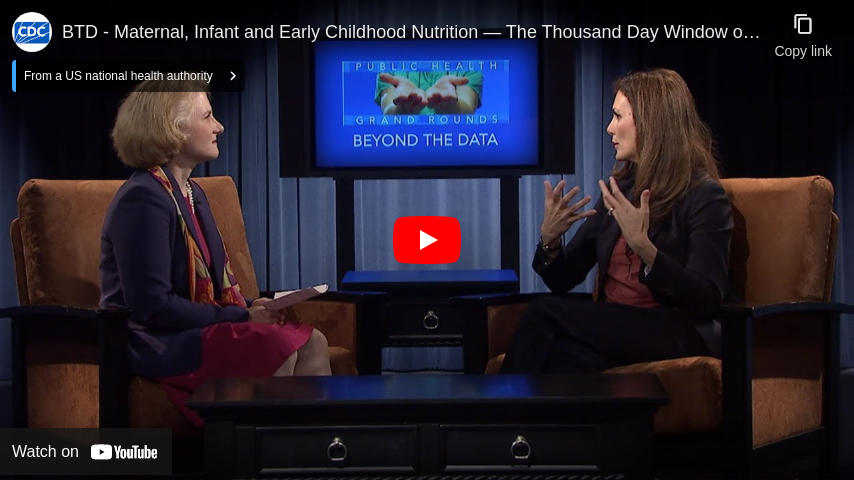Maternal, Infant and Early Childhood Nutrition — The Thousand Day Window of Opportunity
Presented on .
The June session of Grand Rounds, “Maternal, Infant and Early Childhood Nutrition — The Thousand Day Window of Opportunity,” was viewed in 31 states and 25 foreign countries.
One thousand days refers to the period from pregnancy through a child’s second birthday, when optimal nutrition is critical for brain development, healthy growth, and setting children on a trajectory for lifelong health. Unfortunately, only a third of women gain the appropriate amount of weight during pregnancy and about 16% of pregnant women have iron deficiency. Almost 1 in 5 babies are never breastfed. Among 1 year olds, fewer than half have eaten a vegetable, and 1 in 3 consume a sugary drink on a given day.
This session of Public Health Grand Rounds will explore how a woman’s nutrition during this time can impact both her own health and the child’s health, identify strategies that support women to breastfeed, and provide recommendations regarding an infant’s transition to the family diet. Together these factors have a profound impact on a child’s ability to grow, learn, and thrive.
Good nutrition during pregnancy and through a child’s second birthday plays a powerful role in a baby’s health. Listen as Dr. Phoebe Thorpe and Lucy Sullivan discuss weight gain during pregnancy, the benefits of breastfeeding to both mother and child, peanut allergies, and babies’ introductions to different foods.
Learn more
https://www.cdc.gov/nccdphp/dnpao/resources/maternal-infant-toddler-resources.html
Why should all plant-based milks be avoided in infants?
Thank you for your question. The American Academy of Pediatrics has recommended against the use of plant-based milks for the first year of life. Liquids, non-dairy “milks,” based on plant foods (e.g., soy, rice, almond, or hemp) should not be used as a human milk or infant formula substitute. The caloric density of these products is typically lower than that of human milk or infant formula; protein quality is low and the protein quantity is low for most such beverages; products may not be fortified with micronutrients to levels recommended for infants and young children; and some contain high levels of phytate, which bind iron, zinc, and calcium. Use of such alternative fluids as a major component of the diet has been associated with severe protein energy malnutrition and with growth faltering. Plant-based milks should not be confused with soy-based formula, which may be appropriate for use in infants (up to 12 months of age) with galactosemia and hereditary lactase deficiency.
What is the research basis for the need for iodine supplementation during pregnancy? The question is regarding the accuracy of estimations of iodine consumption assuming much iodine in the US is from iodized salt.
Thank you for this important question. Iodine is an element that is needed for the production of thyroid hormone. Thyroid hormone helps the body use energy, stay warm and keep the brain, heart, muscles, and other organs working as they should. The body does not make iodine, so it is an essential part of the diet. During pregnancy, both the mother and the baby produce their own thyroid hormones, but the baby is dependent on the mother for adequate ingestion of iodine. The fortification of salt with iodine in the U.S. is voluntary. This means not all salt in the U.S. is fortified with iodine. It is estimated that about 53% of table salt sold in the US is iodized, and table salt accounts for only 11% of the daily intake of salt. The majority of salt intake in the U.S. diet comes from processed foods, where the vast majority is not iodized. The primary sources of iodine in the U.S. diet include dairy products, eggs and breads, but iodine concentrations are variable. The Recommended Dietary Allowance (RDA) for iodine in adult men and women is 150 μg per day and higher for women who are pregnant or breastfeeding at 220ug. In the U.S., one teaspoon of iodized salt contains approximately 250 μg iodine. Most U.S. iodine-containing multivitamins marketed for non-pregnant adults have at least 150 μg iodine, but only about 60% of prenatal multivitamins in the U.S. contain iodine. Additionally, less than 1 in 5 women take a prenatal vitamin containing iodine during pregnancy. Because the effects of iodine deficiency are most severe in pregnant women and their babies, the American Thyroid Association has recommended that all U.S. women who are planning pregnancy, pregnant, or breastfeeding take a prenatal multivitamin containing 150 μg iodine per day. For more information on iodine deficiency and iodine supplementation recommendations, please refer to https://www.thyroid.org/iodine-deficiency/
- Andrea Sharma, PhD, MPH, Commander USPHS
- Epidemiologist
Division of Nutrition, Physical Activity and Obesity
National Center for Chronic Disease Prevention and Health Promotion, CDC
"Nutrition in the First 1,000 Days: Laying the Foundation for Health and Development"
- Michelle Kominiarek, MD, MS
- Physician
Maternal-Fetal Medicine, Northwestern Memorial Hospital
Associate Professor, Division of Maternal-Fetal Medicine, Department of Obstetrics and Gynecology, Northwestern University Feinberg School of Medicine
"Conception to Birth: Maximizing Maternal and Fetal Nutritional Status"
- Rafael Pérez-Escamilla, PhD
- Director
Yale School of Public Health
"Infant Nutrition: Supporting Breastfeeding Right from the Start"
- Frank Greer, MD
- Professor of Pediatrics (Emeritus)
University of Wisconsin School of Medicine and Public Health
Professor (Affiliate), Nutritional Sciences at the University of Wisconsin College of Agriculture and Life Sciences, Fellow, American Academy of Pediatrics (AAP) and past Chair, AAP Committee on Nutrition
"What Do We Know About The Timing of Introduction, Types, and Amounts of Complementary Foods?"
- John Iskander, MD, MPH
- Scientific Director
- Phoebe Thorpe, MD, MPH
- Deputy Scientific Director
- Susan Laird, MSN, RN
- Communications Director
Get notified about the latest updates from Public Health Grand Rounds right in your inbox by setting up an alert today!
Get notified about the latest updates from Public Health Grand Rounds right in your inbox by setting up an alert today!Sign Up
Get notified about the latest updates from Public Health Grand Rounds right in your inbox by setting up an alert today!
This session is available for Continuing Education (CE). Register here using the course information below.
CDC Course Code: PHGR10
CPE UAN: 0387-0000-19-006-H04-P
For more information, see Grand Rounds Continuing Education.


